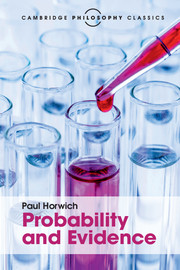Preface to this edition
Published online by Cambridge University Press: 05 August 2016
Summary
While it is difficult to say in general terms what makes a book a classic, it is often not difficult to decide that some given book is one, and to my mind there is no doubt that this book is. Despite the author's disclaimer in his Introduction that he is following a Wittgensteinian strategy in eschewing any grand philosophical scheme, there is one in this book: the Bayesian theory, which Paul Horwich regards as illuminating an entire spectrum of philosophical problems associated with that peculiarly scientific subdomain of epistemology, the so-called scientific method. And illuminate it it certainly does in Horwich's book, a masterpiece of simplicity and elegance that belies the often-challenging nature of the material. Here is one characteristic of a classic that we can tick without further ado.
Probability and Evidence was published at a time when it was becoming increasingly fashionable to deny that the methods of science, allegedly heavily constrained by the socio-economic-cultural milieu in which scientists operate, are in any way sui generis, or uniquely meriting a patent of objectivity. Curiously enough, the Bayesian framework for evaluating theories and evidence also subscribes to the view that there is nothing specifically to do with the sciences in the inferential methods it endorses. On the other hand it cedes nothing in the way of objectivity, being nothing less than a logic of uncertain inference, an account of how factual hypotheses in general are evaluated against evidence, whatever the specific context. This combination of universality and logical rigour was repeatedly stressed by the great twentieth-century Italian Bayesian, Bruno De Finetti, to whom so much of the modern development of the theory is due. But despite its generality the Bayesian theory was developed, by De Finetti and others, primarily to illuminate the procedures of scientific inference. As indeed it does, and in this book Horwich shows, with his customary clarity, how it can explain such perennial features of scientific method as why, for example, simpler theories are typically preferred to more complex ones, why diverse evidence is valued more highly than evidence from the same source, why genuinely predictive theories are esteemed more highly than those adjusted to the data, and so on.
Information
- Type
- Chapter
- Information
- Probability and Evidence , pp. ix - xPublisher: Cambridge University PressPrint publication year: 2016
